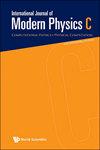耗散流体的量子波表征
IF 1.6
4区 物理与天体物理
Q3 COMPUTER SCIENCE, INTERDISCIPLINARY APPLICATIONS
引用次数: 0
摘要
我们提出了具有移动非线性势的薛定谔方程与纳维-斯托克斯方程之间的映射。根据马德隆变换的一般化,我们证明了在非线性项中加入玻姆量子势和相场的拉普拉斯,可以得到耗散不可压缩纳维-斯托克斯流体的连续性方程和动量方程。此外,还讨论了利用复杂量子扩散建立的另一种解决方案。目前的模型可以捕捉量子流体(如玻色-爱因斯坦凝聚体)中的耗散效应,并促进经典耗散流体量子算法的制定。本文章由计算机程序翻译,如有差异,请以英文原文为准。
Quantum wave representation of dissipative fluids
We present a mapping between a Schrödinger equation with a shifted nonlinear potential and the Navier–Stokes equation. Following a generalization of the Madelung transformations, we show that the inclusion of the Bohm quantum potential plus the laplacian of the phase field in the nonlinear term leads to continuity and momentum equations for a dissipative incompressible Navier–Stokes fluid. An alternative solution, built using a complex quantum diffusion, is also discussed. The present models may capture dissipative effects in quantum fluids, such as Bose–Einstein condensates, as well as facilitate the formulation of quantum algorithms for classical dissipative fluids.
求助全文
通过发布文献求助,成功后即可免费获取论文全文。
去求助
来源期刊

International Journal of Modern Physics C
物理-计算机:跨学科应用
CiteScore
3.00
自引率
15.80%
发文量
158
审稿时长
4 months
期刊介绍:
International Journal of Modern Physics C (IJMPC) is a journal dedicated to Computational Physics and aims at publishing both review and research articles on the use of computers to advance knowledge in physical sciences and the use of physical analogies in computation. Topics covered include: algorithms; computational biophysics; computational fluid dynamics; statistical physics; complex systems; computer and information science; condensed matter physics, materials science; socio- and econophysics; data analysis and computation in experimental physics; environmental physics; traffic modelling; physical computation including neural nets, cellular automata and genetic algorithms.
 求助内容:
求助内容: 应助结果提醒方式:
应助结果提醒方式:


